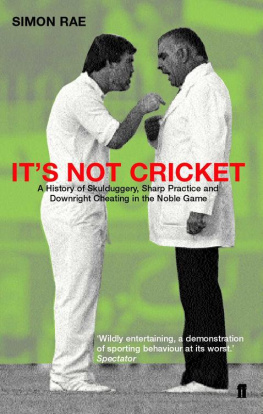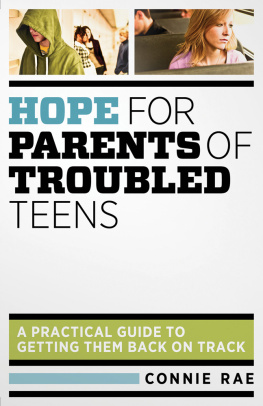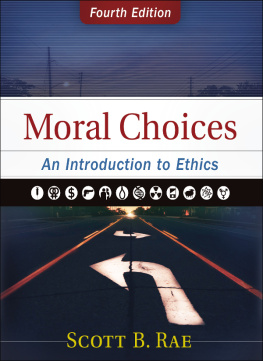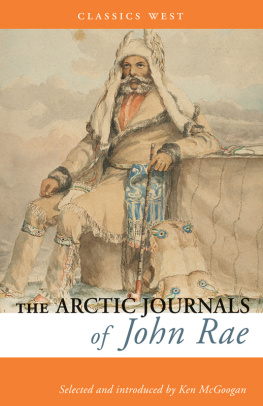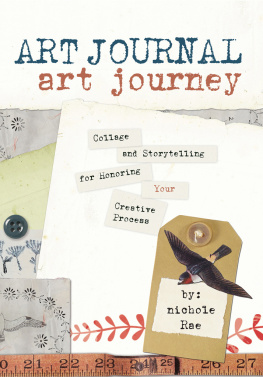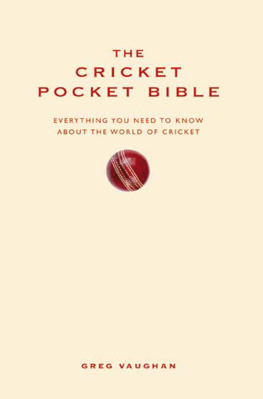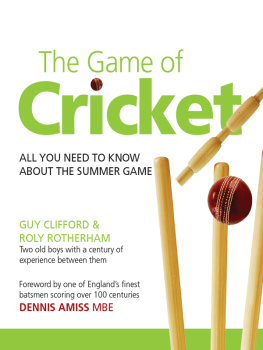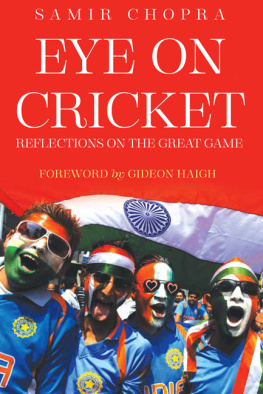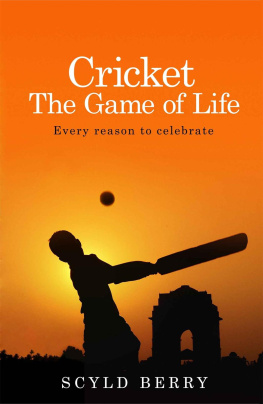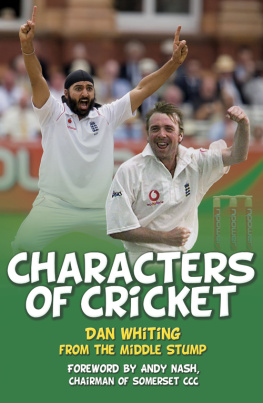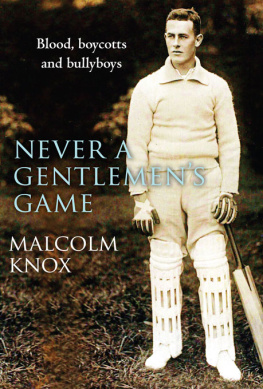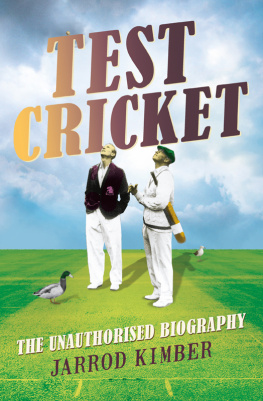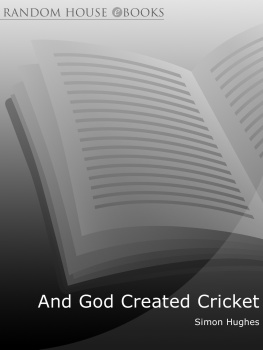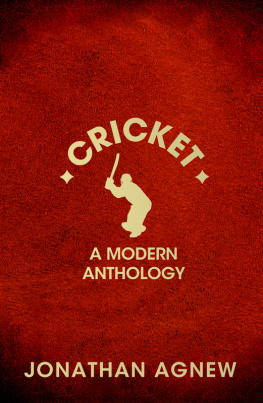The author and publishers would like to thank the following people and institutions for kindly granting permission to reproduce the pictures in this book: The Roger Mann Collection (2, 3, 6); The David Frith Collection (711); The Southland Times, New Zealand (12); Allsport (13, 15); Graham Morris (14); Popperfoto , Northampton (16).
The idea for this book came from my editor Julian Loose, and my first thanks are to him, along with his assistant Angus Cargill, who read the manuscript so attentively. Also at Faber, Brian Simmons gave me encouraging feedback, while David Kynaston, my mentor through the writing of W. G. Grace: A Life, gave a critical appraisal of an early draft. But I am particularly indebted to Ian Smith, who subjected each chapter to a close reading and returned the typescript bristling with instructive marginalia. Needless to say, the faults that remain are my sole responsibility.
There are a number of other people to whom I owe thanks: Bernard Wimpress gave great succour at a difficult time in the rewriting process when he invited me to send an article for his cricket periodical Baggy Green, and Edward Pearce provided similar stimulus by commissioning a piece for Punch. During the course of a convivial evening after I had handed in the manuscript , Gideon Haigh indicated several windows of missed opportunity, but did alert me to a Warwick Armstrong story that made it into the Introduction. In the wake of my Grace biography, Gerald Brodribb kindly shared with me the story of W. G. and E. M. driving Tim OBrien to the brink of violence with their incessant chatter around the wicket while he was batting . David Frith and Roger Mann showed a generous interest in the project and raided their respective collections to provide many of the plates. My thanks to all of them.
The scope of Its Not Cricket has meant that it has had to be compiled almost exclusively from secondary sources, and I gladly record my appreciation of the labours, research and insight of innumerable writers on the game whose works I have pillaged. In several cases, my dependence on a particular title or author has been noted in the text; for the rest, I can only hope that inclusion in the Bibliography will suffice as acknowledgement.
I would like to thank the staff of the following libraries for their assistance: the British Library, the London Library, the Bodleian Library, Warwick University Library, and the MCC Library at Lords, where Stephen Green and his assistant Michael Wolton have been unfailingly helpful.
I am grateful to Kit Wright for permission to quote from his poem I Found South African Breweries Most Hospitable ( Hoping It Might Be So, Leviathan, 2000).
I would also like to acknowledge the invaluable support offered by the Royal Literary Fund. Not only did they help me over a very sticky patch with a grant, but eased the final lap with an RLF Fellowship at Warwick University.
Finally, a word of thanks to my immediate family for their tolerance and support. My mother Jill Rae once again generously helped to allay financial anxieties; Sin Hughes was a mainstay against writers block, dips in confidence, burn-out and other occupational demons, while also being a meticulous and constructive reader of the manuscript; Albertine Rae took time off from GCSE revision to offer tea and sympathy; and, last but not least, Michael arrived in the closing stages to provide a host of joyous displacement activities.
Simon Rae
Stanton Harcourt
Oxfordshire
1st April 2001
This has been a difficult book to finish. It was commissioned before the Hansie Cronje revelations opened the seething vat of worms that is the match-fixing scandal, and I had only just forced a lid down on that last chapter of infamy when the England tour to Sri Lanka exploded in an exhibition of bad behaviour , bad umpiring and bad feeling.
These, as the main text shows, are in fact perennials of the so-called noble game, though judging from some of the coverage you could be forgiven for thinking that the Sri Lankan series plumbed new depths. In fact, it wasnt so very bad. What did we have? Some finger-wagging, some name-calling, some boorish behaviour from the English supporters, and a petulantly flung helmet that bounced off an advertising hoarding. And yet, under the headline One Step from Anarchy, Mike Gatting predicted the end of civilisation as we know it.
He was particularly exercised by Aravinda de Silvas refusal to walk in the third Test: De Silva nicks one to slip but stands his ground. Just what was he thinking? Almost certainly he was thinking of the several occasions when English batsmen had stood their ground, in particular the two batpad catches Nasser Hussain offered during his match-winning century in the previous Test, or the even more outrageous refusal of Graeme Hick to walk having hit a straightforward return catch to Muttiah Muralitharan in the same game.
For many, of course, Gattings position as a cricket moralist would seem compromised by his part in the famous stand-off with Shakoor Rana at Faisalabad in 1987. And that, it might be remembered, though it was the worst, was not an isolated incident . Under his captaincy the England team were renowned for their grudging, not to say surly response to decisions that went against them. The winter after the tour to Pakistan, Gattings side went to Australia to play the Bicentennial match and then to New Zealand for three more Tests. Alan Lee, who covered the tour for Wisden, noted: Englands players again allowed their on-field behaviour to plunge to unacceptable levels. Chris Broad marred the Australian showpiece by smashing his wicket when given out after batting for over seven hours and scoring 139 while Graham Dilley was fined for swearing when an appeal for a catch was turned down during the first Test against New Zealand. But Lee reserved his strongest criticism not for the perpetrators of these tawdry incidents, but the captain, Mike Gatting, whose attitude to overseas umpires appeared not to have altered [from the previous tour to Pakistan]. Although Gatting indulged in nothing as overtly appalling as his row with Shakoor Rana in Pakistan, his expressions and gestures regularly spoke volumes. There were too many times when he appeared to be leading English dissent against decisions, rather than calming it.
But to return to the 20001 Sri Lanka series, even if it broke no new ground it certainly provided a masterclass in unacceptable practices. Take persistent appealing. As far back as 1867, John Lillywhites Cricketers Companion declared: it is not cricket to keep asking the umpire. But both sides in Sri Lanka appealed remorselessly with the clear intention of pressurising the umpires into making mistakes in their favour. The Sri Lankans indulged in this practice more than the Englishmen to the extent that four of them were fined one quarter of their match fees after the first Test in Galle. One of the worst decisions was an lbw against Alec Stewart. The bowler was the Sri Lankan captain Sanath Jayasuriya , who was bowling left-arm orthodox spinners from over the wicket on or outside the leg stump. A ball pitching a good nine inches outside the leg stump turned and hit Stewart on the leg. Up went Jayasuriya, backed up by the irrepressible wicket-keeper Sangakkara, and to the amazement of everyone watching, up went the umpires finger. Stewart publicly described it as the worst decision he had ever experienced in first-class cricket.

